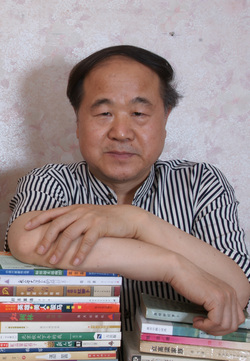Mo Yan


Professor Mo Yan (Guan Moye)
Doctor of Letters, honoris causa (2017)
Mo Yan is the pseudonym of Guan Moye. Famed as a leader among contemporary Chinese writers, Mo Yan is also recognised as one of the leading lights in the international literary scene. In 1985, his debut book, The Transparent Carrot, was published. Next year came Red Sorghum, which stunned the literary world out of the blue. Thereafter his books and novels came one after another: The Republic of the Wine, Big Breasts and Wide Hips, Sandalwood Death, Life and Death Are Wearing Me Out, Frog, and many others. He also published several masterly plays, like Farewell My Concubine and Our Jing Ke. These works manifest his boundless creativity, leaving an everlasting illustrious mark on both Chinese and world literature. Up till now, Mo has composed 11 novels, 25 novellas, 80 short stories, five books of essays and three plays. Most of his works have been translated into many languages and won many prestigious awards. In 2010, he became the first writer from China honoured with the Nobel Prize in Literature. He was presented with honorary doctorates by The Chinese University of Hong Kong, The University of Macau, The Open University of Hong Kong, Fo Guang University of Taiwan, Sofia University of Bulgaria, Aix-Marseille Université of France and The City University of New York, USA.
Mo Yan has deep roots in the cultural soils of China. He came from the rural area, and yet his works transcend his rural background. His works often proceed from his birthplace, Gaomi county in Shandong province, and in the course of composition gives his native land a much more expansive physical space and endless yearning of the people that form the bedrock for series of long and colourful developments and events. With this background, Mo’s works are fiction fused with reality and contemporary society, and with a rich array of myths and legends, folklores and fantasies, suitably assimilated. With fathomless imagination, and adorned with vivid details, wonderful structures, flexible and yet volatile and meticulous narration, he records the ever changing Chinese society in his works. He describes the fatalism of human suffering and torment, and exposes both the hidden human characteristics and the deeply ingrained journey of their heart and soul. His writings mock fate through humorous episodes. Be it comedy or tragedy, they are all shockingly subversive, profoundly exposing and criticising the absurdity of society. They nevertheless portray a compassionate heart when confronted by society’s imperfections, its dark sides and crimes. In his books and novels, he feels and reflects on the sufferings in life. He cries out for human respect and values, and has developed a unique narrative style in which he builds the frameworks of his masterpieces, and imbues such frameworks with characters and stories of great emotional depth and permeating power. He sets off in his true self, juggling various types of culture and imagination, making reference to the heritage of outstanding novels of the world, but at the same time adhering to the Chinese tradition. Both Chinese and Western art forms integrate into his works, producing a self-sufficing, smooth and perfect frame. He is unique in his search for aesthetics in his works, and gives a miraculously modern interpretation to the traditional Chinese debate on the “distinction between word and meaning”, embedding symbolism in form changes deep and far reaching imagic significance, thus providing the readers the greatest room for reflection and exploration. All and all, he is an excellent story teller. The language of his books and novels possesses great force in dissemination and infiltration. Cast in an unrestrained and stately style, adroit at will, he acts and pauses at the right moments. He raises the expressive power of the Chinese language to new heights, and adds to it glory, powerfully showing the world the great charm of the Chinese language.
Mo Yan’s relation with Hong Kong Baptist University goes far back and deep. In 2008, his great novel, Life and Death Are Wearing Me Out, was awarded the “Dream of the Red Chamber Award” organised by the Arts Faculty of the University. In 2016, he attended the 60th anniversary celebration of the University, during which he gave a distinguished lecture on “Literature and Homeland Soils”, which has etched profound memory on the minds of the Baptist community.
Mr. Guan Moye, or more affectionately known as Mo Yan, is a great master in literary writing. His exploration and creativity, his achievements and glory, the depth and breath of his works, and his influence on the development of world literature will be monumental in the history of literature.